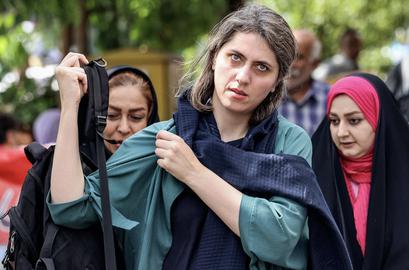Time magazine named Pardis Sabeti as a Person of the Year in 2014 for her contribution in the fight against virus Ebola, and listed her as one of the 100 Most Influential People in 2015. She graduated from Harvard Medical School with a perfect score of 100 and the Massachusetts Institute of Technology (MIT) named her as the 49th most important scientific figure in the world.
Sabeti is an Iranian-American computational biologist, as well as a medical and evolutionary geneticist. She has developed an algorithm that explains the role of genetics in the evolution of disease and devised a statistical model in bioinformatics that identifies which parts of the genome have been subject to evolution.
Sabeti was born in Tehran in 1975 to Nasrin and Parviz Sabeti, a high official in Savak, the shah’s secret police, who came from a Baha’i family. Her family escaped Iran in October 1978, shortly before the 1979 Islamic Revolution. After a short stay in Israel, they moved to the United States and settled in Florida.
Her father’s job and his record has been condemned by many, including human rights groups, but Pardis’ high scientific status and her independent character have protected her from the infamy associated with his father.
During her childhood in Orlando, Florida, as she puts it, Pardis “went through the typical phases.” “First, I wanted to be a flower-shop owner because I liked flowers,” she says. “Then I was drawn to creative writing, so I wanted to be a novelist. That followed with wanting to be a doctor. Those were mostly chosen because I actually knew that they were jobs. In truth, what I always liked the most was math. I just didn’t know that there was a job in math at the time, which is a little funny to think about now.”
Before going to medical school, Pardis studied biology at the Massachusetts Institute of Technology (MIT) and graduated in 1997 with a major in biology. She was then a Rhodes Scholar at New College, Oxford, and completed her doctorate in evolutionary genetics in 2002. Finally, she graduated with the highest honor as a medical doctor from Harvard Medical School in 2006. She was only the third woman to receive this honor.
After she graduated, however, Pardis did not practice medicine but chose research instead: “I had planned to be a doctor, so pursuing my medical degree was always something that I was on track to do. I had decided that it would be neat to have a year off before I went to medical school, so I began applying for different things, including the Rhodes scholarship. Once I got the Rhodes, I essentially had three years off instead. Going into college, I didn’t really understand what a PhD was, so I had no intention of doing a PhD, but winning the Rhodes made me think about what I wanted to do for a couple of years before medical school. The more I got engaged in research, the more excited I became about it. By the time I started medical school, I was already really enjoying research. By the time I finished, I really surprised myself in discovering that I enjoyed research a lot more than medicine.”
The Bill and Melinda Gates Foundation awarded her a $2 million budget to research the malaria genome, and she has published more than 20 research papers in top scientific publications, including Science and Nature. In 2012 she received the Smithsonian magazine's American Ingenuity Award in the Natural Sciences category and, in 2015, she was the recipient of the Howard Hughes Medical Institute Investigator award.
Sabeti is an associate professor at Harvard University and a senior associate member at the Broad Institute, a biomedical and genetic research institute associated with both Harvard and MIT.
Besides her scientific achievements, she is also the singer of the alternative rock band Thousand Days, which has released a number of albums.
“Tied” to Iranian Culture
“One of the reasons that I can do many things like be a musician, a scientist, and so on is because I came from such a different culture into a new culture,” she told the US TV network PBS in an interview. “And because my parents didn't know what American culture was, they just made it whatever they thought it was supposed to be — it became very fluid. There were no boundaries as to who we were and what we could do.”
“I speak Persian at home and I'm definitely very tied to my Iranian culture, but it's really a mix because I do feel very American,” she said. “I remember when my parents would take us to Disney World and how I really loved it there, especially at Circus World. On old family videos, you can hear me speaking in Persian and then saying ‘Circus World’ a lot.”
When asked if she had a role model, she answered, “I've never liked the term ‘role model.’ I'm just me, and there are plenty of things I would change about myself because I'm definitely not perfect. I do hope people see me as who I am: an Iranian-American, a woman, a scientist, a teacher, and so on. But I don't think people should want to be like me. Something more exciting to me would be if I could help other people become who they are inside and achieve their own goals. I hope that if I'm inspirational, it's in that way.”
“I was born in Tehran, Iran. I’m very proud of my Iranian heritage,” she said in another interview. “I think most Americans don’t really have a sense of who Iranians are. They see a lot of what’s going on by the regime and the people in power and they reflect it to us, but we’re very different from that. You see Iranians in America and how creative they are and how excited they are and how much they get involved in their communities, and I think it’s a wonderful thing.”
In July 2015, Sabeti suffered a near-fatal accident during a conference in Montana but returned to teaching at Harvard after completing rehab. She joked about the accident and her horrible injuries: “It’s a piece of art; I have 30 rods in my pelvis. Part of the reason I got to rehab is so I can run around like a crazy person with those freshmen. Or roll around like a crazy person.”


























comments